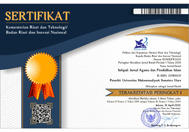Methods For Developing Student Morals In Learning Islamic Religious Education At MTs Negeri 1 Mataram City
Abstract
The world of education is currently very worrying, the facts that have occurred recently are deviations in student behavior that are very surprising. In these conditions, educational institutions seem to be experiencing failure in forming and developing student morals, thus requiring educational institutions to repackage the learning process, especially in developing student morals. The aim of this research is to describe and analyze the general picture of methods for developing student morals in learning Islamic religious education) for MTS Negeri 1 Mataram City students. The research method used is field research using a qualitative approach. The research subjects used were Islamic religious education teachers, school principals, and representatives of MTS Negeri 1 Mataram City students. Meanwhile, the research object is the method of developing student morals in learning Islamic religious education at MTS Negeri 1 Mataram City. Data collection will be carried out by means of direct observation, structured interviews and review of documents related to the variables to be studied. Data processing techniques are carried out by reducing data, displaying data and verifying data. Based on the results of research related to the method of developing student morals at MTs Negeri 1 Mataram City, they are as follows; 1) The morals of students at MTs Negeri 1 Mataram City are the morals of students to Allah SWT, the morals of fellow students, the morals of students to teachers and staff, the morals of students to society, and the morals of students to the environment; 2) The method applied by teachers in developing student morals at MTs Negeri 1 Mataram City is; Hiwa method (conversation or dialogue); story method; Amstsar method (Parable); exemplary method; habitual method; ibra and mau'izhah methods; and targhib and tarhib methods.
Keywords
Full Text:
PDFReferences
Arikunto. (2012). Prosedur Penelitian suatu Pendekatan Praktek. Rineka Cipta. Jakarta.
As’adi, W. (2018). Upaya guru pendidikan agama islam (pai) dalam membina akhlak siswa di SMP N 1 Kesesi Kabupaten Pekalongan. http://etheses.uingusdur.ac.id/713/
Hamid, A. (2016). Metode internalisasi nilai-nilai akhlak dalam pembelajaran pendidikan agama Islam di SMP Negeri 17 kota Palu. Jurnal Pendidikan Agama Islam, 14(2), 195–206.
Pakapahan, E. (2013). Kumpulan Karya Tulis Ilmiah (Strategi Guru Agama Islam dalam Pembinaan Akhlak Siswa). http://tugasakhiramik.blogspot.com/2013/03/strategiguru-agama-islam-dalam.html
Tanzeh, A. (2017). Pengantar Metode Penelitian. Teras Yogyakarta.
Raudhatinur, M. (2019). Implementasi Budaya Sekolah Islami dalam Pembinaan Akhlak Siswa SMP Negeri 19 Percontohan Banda Aceh. DAYAH: Journal of Islamic Education, 2(1), 131-150.
Lexy J. Meleong. (2012). Metode Penelitian Kualitatif Edisi Revisi. Remaja Rosdakarya. Bandung.
E. Mulyasa. (2014). Menjadi Guru Profesional. PT. Remaja Rosdakarya. Bandung.
Nanang Fattah. (2017). Landasan Manajemen Pendidikan. PT. Remaja Rosdakarya. Bandung.
Nanang Sudjana dan Ibrahim. (2012). Penelitian dan Penilaian Pendidikan. Sinar Baru. Bandung.
SANI, F. (2017). Metode Guru Pendidikan Agama Islam (PAI) dalam Pembinaan Karakter Religius Siswa Melalui Kegiatan Keagamaan Di SMPN 1 Ngunut Tahun 2015/2016.
Wina Sanjaya. (2014). Perencanaan dan Desain Sistem Pembelajaran. Kencana. Jakarta.
DOI: https://doi.org/10.30596/13292
Refbacks
- There are currently no refbacks.
Intiqad Jurnal Agama dan Pendidikan Islam is abstracting & indexing in the following databases:
View My StatsEditorial Address:
Faculty of Islamic Religion, Universitas Muhammadiyah Sumatera Utara. Jl. Mukhtar Basri No. 3 Medan 20238 Telp. (061) 6622400 ext. 27 dan 28 Fax. (061) 6625474. e-mail: intiqad@umsu.ac.id

_(1).png)























